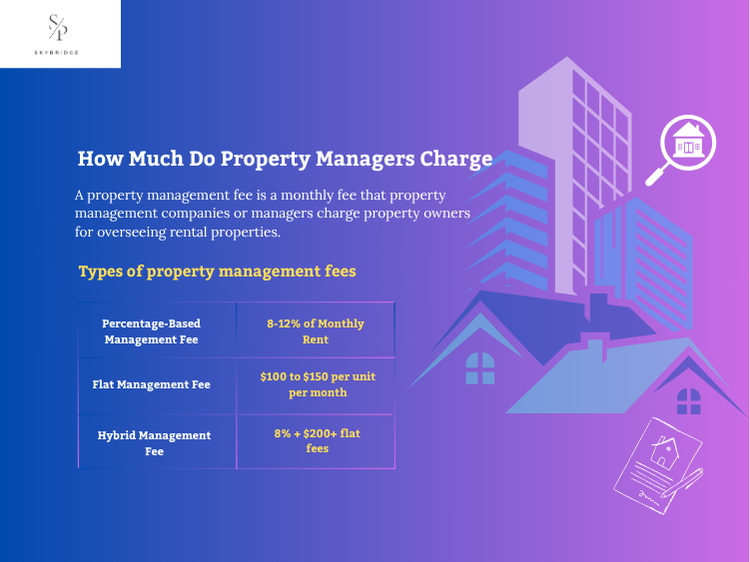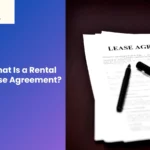Property managers typically charge between 8 to 12% of the monthly rent or a flat monthly fee ranging from $100 to $500, depending on the property type and the services provided. These charges fall under three main models, which are percentage-based fees, flat-rate fees, and hybrid structures that combine both.
For example, managing a luxury condo in Los Angeles might involve a 12% fee with added leasing charges. On the other hand, a single-family rental in a quieter market like Bakersfield might only require a fixed $120 monthly fee. These differences reflect variations in management complexity, local demand, and service expectations.
While cost is a key consideration, it is equally important to evaluate what those fees cover. Effective property management includes tasks such as rent collection, maintenance coordination, tenant screening, and legal compliance. These services contribute to stable rental income, lower vacancy rates, and reduced legal risk.
This guide walks through the most common fee models, outlines additional costs that may apply, and explains how to evaluate the value that each fee structure delivers. By comparing fee structures and understanding their purpose, rental owners can make informed decisions that protect their assets and improve long-term profitability.
What is a Property Management Fee?
A property management fee is a monthly fee that property management companies or managers charge property owners for overseeing rental properties. Property management fees can vary in structure, commonly taking the form of a percentage of monthly rent (8-12%), a flat monthly rate ($100-$500), or a hybrid of both (8% + $200+ flat fees). This fee covers core services such as rent collection, tenant communication, property maintenance coordination, and lease enforcement, all while ensuring compliance with relevant laws and regulations.
What are the different types of property management fees?
Property management fees are generally categorized into percentage-based, flat rate, hybrid, and additional management fees. Each type varies in how fees are calculated and what services they cover, offering property owners different options based on their property size, type, and management needs.
Understanding these fee structures helps owners select the right model that aligns with their budget and service expectations, especially in diverse markets like California, where fee percentages and amounts can fluctuate.
| Fee Type | Calculation Method | Typical Range | Suitable Property Types | Pros | Cons |
| Percentage-Based Fee | A certain % of the monthly rent collected | 8% – 12% | Single-family, Luxury, Multi-family | Scales with income, aligns interests | Fluctuates with vacancies |
| Flat Fee | Fixed monthly amount | $100 – $500 | Small, lower-rent properties | Predictable budgeting | Less flexible if rent rises |
| Hybrid Fee | Base% + flat fees for extra services | 8% + $200+ flat fees | Multi-family, Commercial | Customizable, covers extras | Can get costly with many add-ons |
| Additional Fees | Event-triggered fixed/variable fees | Varies | All | Covers unique events | Can surprise owners |
Percentage-Based Management Fee (Percent of Monthly Rent)
The percentage-based management fee is a monthly charge calculated as a fixed percentage, commonly between 8% and 12% of the rent collected. This fee model scales with rental income and is widely used for single-family homes and luxury properties.
Advantages include alignment with rental income, meaning the manager’s compensation reflects property performance, and scalability as rents increase or decrease. However, costs can fluctuate during vacancies or rent reductions, which may affect predictable budgeting. In California’s competitive market, this fee range is typical, but exact percentages vary by location and property type.
Flat Management Fee (Fixed Fee)
A flat management fee is a fixed monthly payment that a property manager charges regardless of the rent amount. This fee model offers predictable budgeting and is especially suitable for smaller properties or those with lower rental rates.
Flat fees typically range from $100 to $500 per month in California. While this model provides cost certainty, it may lack flexibility compared to percentage-based fees, especially if rental income rises significantly. Owners must weigh the trade-off between consistent costs and potential savings based on rent fluctuations.
Hybrid Management Fee (Percentage + Flat Fee for Additional Services)
The hybrid fee structure combines a base percentage fee with additional flat fees for specific services such as leasing or maintenance coordination. Property managers charge a percentage of rent plus fixed fees for these extra tasks.
This model is common in multi-family and luxury properties, where additional services like tenant placement, inspections, or lease renewals require separate billing. For example, a manager might charge 8% of rent plus a $200 flat leasing fee when securing a new tenant. This approach provides flexibility to customize fees based on service complexity.
Additional Management Fees
Beyond base management fees, property owners may incur additional service or event-triggered fees, such as:
- Contract Setup Fee:
A one-time fee is charged at the beginning of a management agreement to cover administrative tasks such as drafting contracts, setting up the owner and property in the system, and preparing initial documentation.
- Reserve Fund Requirement:
Property managers may require owners to maintain a minimum balance (often $250–$500) in a reserve fund. This fund is used to pay for unexpected repairs, emergency services, or small expenses without requiring immediate owner approval.
- Marketing and Leasing Fee:
Property managers charge marketing and leasing fees to cover the costs of advertising the rental, conducting property showings, screening prospective tenants, and preparing the lease agreement. It is usually billed as a flat fee or as a percentage of the first month’s rent.
- Vacancy Inspection Fee:
A charge for inspecting the property during unoccupied periods. Managers assess the property’s condition, check for necessary maintenance, and ensure it’s secure, particularly important for multi-family or seasonal rentals.
- Maintenance Fee:
These cover coordination and oversight of repair or upkeep tasks. While basic maintenance may be included in management, larger repairs might incur a surcharge or an administrative fee (e.g., 10% of the repair invoice).
- HOA Coordination Fee:
If the property is part of a homeowners association, the manager may charge a fee for handling communication, compliance issues, or coordination with the HOA board and their rules.
- Lease Renewal Fee:
A flat fee for renewing a tenant’s lease, which includes updating documentation, negotiating terms, and executing the new agreement. This is common in long-term rental management.
- Late Payment Fee:
If tenants fail to pay rent on time, some managers charge a fee for the added effort of tracking, collecting, and processing late payments. This may be a portion of the tenant’s late fee.
- Eviction and Collection Fee:
If legal action is required due to non-payment or lease violations, property managers may bill separately for the time spent filing paperwork, attending court, or hiring attorneys or collection agencies.
- Contract Termination Fee:
An early termination of the management agreement may result in a penalty, especially if done without notice. This fee compensates the manager for the sudden loss of business and the administrative tasks of closing the account.
What are the factors that affect property management fees?
The factors that affect property management fees include property type, size, location, condition, local market competition, neighborhood reviews, and the range of services offered. Each of these elements plays a crucial role in determining the overall cost and scope of management fees, influencing how much property owners pay and what they receive in return.
The main factors that affect property management fees are:
- Property Type
- Property Size
- Property Location
- Property Condition
- Local Market Competition
- Neighborhood Reviews
- Services Offered
Understanding these influences allows property owners to select appropriate management plans and optimize their investment returns.
Property Type
Property type is one of the most significant determinants of management fees because different categories, such as single-family homes, multi-family buildings, luxury estates, and commercial properties, require varying levels of management complexity and tenant interaction.
Multi-family and commercial properties usually incur higher fees due to the greater number of tenants, increased maintenance needs, and complex legal requirements. Luxury properties demand premium services, which also elevate fees compared to standard residential units.
Property Size
The size of a property, measured by unit count, square footage, or portfolio size, directly impacts the resources a property manager must allocate, thereby influencing fees. Larger properties or extensive portfolios typically require more time, staff, and coordination, which results in higher management costs.
However, property managers may offer scaled or discounted fees based on size to maintain competitive pricing for owners managing multiple units or buildings.
Property Location
Geographical location critically affects property management fees due to differences in local market rates, regional regulations, and service demand intensity. Urban markets, especially in California cities like Los Angeles and San Francisco, tend to command premium fees reflecting higher living costs and competitive service environments.
In contrast, suburban or rural properties often experience lower fees, but local regulations and market conditions can still cause variability in costs.
Property Condition
A property’s physical condition strongly influences management fees because older or poorly maintained properties demand more frequent maintenance, emergency repairs, and ongoing oversight.
Managers typically charge higher fees for properties that require substantial upkeep to maintain tenant satisfaction and legal compliance, whereas newer or well-maintained properties incur lower operational complexity and associated fees.
Local Market Competition
The density of property management providers and the level of service demand in a market area can cause fees to fluctuate. High competition among property managers tends to reduce fees as companies contest for business, while areas with fewer providers or premium markets often see increased fees due to limited options.
California’s real estate markets exhibit these dynamics distinctly, giving property owners room to negotiate fees based on local competition.
Neighborhood Reviews
The reputation of a neighborhood, including tenant satisfaction and safety ratings, affects management fees by influencing demand for rental properties and the perceived value of management services.
Properties in well-regarded neighborhoods with positive online reviews typically justify higher management fees, whereas those in less desirable areas may experience downward pressure on fees due to lower demand.
Services Offered
The scope and quality of property management services have a direct impact on fees. Basic management typically covers rent collection and lease enforcement, while full-service packages add tenant screening, maintenance, legal compliance, and HOA coordination.
Property owners selecting comprehensive service bundles generally pay higher fees, reflecting the additional work and responsibility the manager assumes.
Use the filters to narrow down the questions related to your property management needs.
Tips on Hiring the Right Property Manager For Your Rental Property
Hiring a qualified property manager is essential to protect your rental income, ensure legal compliance, and maintain operational efficiency. The right manager will not only handle day-to-day tasks but also help preserve the value of your property and foster positive tenant relationships.
Property owners should follow this practical checklist while hiring a property manager:
- Verify licensing and certifications: Ensure the manager holds a valid license, especially in California, where it is legally required for anyone managing rental properties on behalf of others.
- Evaluate experience with your property type: Confirm that the manager has proven experience managing properties similar to yours, whether it’s single-family homes, multi-family units, luxury residences, or commercial buildings.
- Conduct thorough interviews: Ask specific, structured questions about their service offerings, tenant communication approach, response time, and how they calculate property management fees.
- Check references and client reviews: Speak with current or past clients to assess the manager’s reliability, professionalism, and how they handle maintenance coordination, tenant issues, and rent collection.
- Assess responsiveness and professionalism: Pay attention to their communication style and speed during early interactions. A reputable and responsive manager will be clear, punctual, and proactive.
- Review the management contract carefully: Examine fee structures, service scope, termination clauses, and any hidden or additional charges that may apply.
Avoid red flags such as unlicensed status, poor communication, or unclear fee structures. Choose a trustworthy, licensed, and experienced manager whose services align with your investment goals and property needs.
Complete the tasks and earn points as you learn how to hire the best property manager for your rental property!
Ensure the property manager holds a valid license, especially in your region.
Ensure the manager has experience managing properties like yours (single-family, multi-family, etc.).
Ask the manager about their approach to tenant communication and problem-solving.
Speak with past clients or read reviews to assess the manager’s reliability.
Progress: 0%
Your Points: 0
Badges Unlocked:
Are Property Managers Worth It?
Yes, property managers are worth it when their services lead to higher rental income, fewer vacancies, and smoother property operations. For many owners, especially those with multiple units or limited time, the value they receive far exceeds the cost of professional management.
The benefits of property management include improved rent collection, timely maintenance coordination, legal compliance, and reduced tenant turnover. These services not only protect the property but also help maintain consistent cash flow and tenant satisfaction. Managers also save owners significant time by handling daily responsibilities and responding to tenant issues.
While property management fees are a recurring cost, they often pay off through indirect gains like risk reduction, time savings, and long-term profitability. Owners should evaluate these benefits against the fees to determine the true return on investment.
Are Property Management Fees Tax-Deductible?
Yes, property management fees are generally tax-deductible against rental income under IRS guidelines. These include routine charges such as monthly management fees, tenant placement costs, and lease renewal fees. As operating expenses, they reduce taxable rental income and are considered ordinary and necessary for maintaining rental property.
Owners report these deductions on Schedule E (Form 1040), which covers income and expenses from rental real estate. If a third-party manager is paid $600 or more in a year, the owner may also need to issue Form 1099-MISC to report those payments.
To comply with California and federal tax laws, property owners should retain supporting documentation like contracts and invoices. Consulting a tax professional ensures proper reporting and helps maximize deductions related to property management services.
Do Fees Change Based on Property Type?
Yes, property management fees vary depending on the type of property being managed. Single-family homes, multi-family units, luxury residences, and commercial properties each present different service demands that affect fee structures.
For example, single-family properties may incur management fees ranging from 8–10% of monthly rent, while multi-family and luxury units may push that range to 10–12% due to added complexity, maintenance needs, and tenant volume.
The property type not only influences base fees but also affects additional charges like leasing fees, inspections, and repair coordination, making it a key factor in overall management costs.
What Hidden Costs Should You Expect?
Owners should expect hidden or unexpected fees, like lease termination and eviction fees, beyond standard property management charges. These costs often arise from specific events or additional services not covered under the base fee.
Some hidden fees included in the property management fee are:
- Late Payment Fees: Penalties for delayed tenant rent payments.
- Lease Termination Fees: Charges for ending a lease early.
- Emergency Repair Costs: Fees for urgent maintenance outside the regular service scope.
- Eviction Fees: Legal expenses and filing costs during the tenant eviction process.
- Lease Renewal Fees: Charges for renewing existing leases.
- Annual Inspection Fees: Costs for property reviews are not included in monthly management.
To avoid surprises, property owners should request full fee disclosures in advance and carefully review the management contract for all potential charges.
Will a Property Manager Improve Your Rental Profit?
Yes, a professional property manager can improve your rental profit by enhancing efficiency and reducing costly risks. Their ability to attract reliable tenants, enforce lease terms, and coordinate maintenance proactively helps maximize income and minimize turnover.
Managers also ensure timely rent collection and reduce vacancy rates. Though management fees are an ongoing cost, they are often justified by savings in time, reduced legal exposure, and overall operational gains.
Owners should evaluate management ROI by looking at total rental income versus vacancy losses, tenant-related issues, and time invested. For many, the value gained from professional oversight far exceeds the fee paid.
Is Professional Management Worth It for Small Properties?
Yes, professional management can be worth it for small property owners who want to reduce stress, save time, and ensure legal compliance. Even a single rental unit involves maintenance, communication, and risk management responsibilities that can overwhelm busy owners.
Small-scale landlords often benefit from having a licensed manager handle tenant screening, repairs, and lease enforcement, especially when they live off-site or have other full-time commitments.
Owners should consider professional help when facing frequent tenant issues, maintenance delays, or burnout. In California, with its strict tenant laws, hiring a qualified property manager may prevent costly legal issues and ensure peace of mind.
What Are the Risks of Managing Rentals Yourself?
Managing rentals yourself involves serious risks, including legal exposure, financial loss, and operational stress. Without professional support, property owners may struggle with the complexities of California’s rental laws, tenant relations, and ongoing maintenance demands.
Below are the risks associated with self-management of rentals:
- Legal Liability: Missteps in handling evictions, notices, or lease enforcement can lead to costly lawsuits and fines.
- Tenant Disputes: Inadequate conflict resolution may result in escalated issues, property damage, or vacancy loss.
- Missed Rent Payments: Lack of structured collection processes disrupts income and weakens financial stability.
- Burnout: Handling repairs, communication, and legal issues alone can become overwhelming, especially for part-time landlords.
Compliance Issues: Failing to stay updated on evolving housing regulations risks penalties or loss of rental privileges.
Get a Quote from Skybridge Property Group
Skybridge Property Group is a trusted provider managing properties in key California markets, including:
Our Key Service Areas:
Ready to get started? Fill out the form below for a quick quote and consultation, or contact us for more information.







